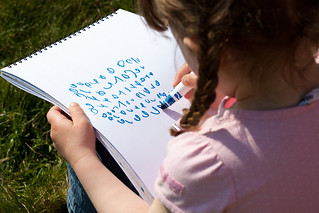Have you ever sat pondering WHY a student who is a strong READER is NOT a strong writer? Competent, yes, but not “functioning” at the SAME level as their reading skills?
Flickr Creative Commons Photo by Mikael Wiman
I have. EVERY year, once the year end achievement results are shared with us. If truth be know, this is not a new phenomenon for me … nor for many of us. I have witnessed this gap, time and time again, over the 27 years I have taught.
So … I decided to do some research to see I could find some articles that would help to EXPLAIN the reasons for WHY writing proficiency often developed at a different rate than reading. I was SURPRISED at how LITTLE seemed to be out there.
Like a pit bull on a QUEST, I decided to put the question to my AMAZING Twitter PLN. It took a bit … but … I was rewarded with several inspiring conversations with people around the globe. That’s what I LOVE about my incredible colleagues on twitter!
It was not surprising, but it was also reassuring, to know that I was not the ONLY one looking for answers:
@RentonL @MiriamTrehearne We have found it similar in our school results. Pls share any info you find out.
— Tanya Braybrook (@TanyaBraybrook) September 27, 2013
A variety of thoughts were shared:
@RentonL I’ve always thought it was the combo of cognitive and motor skills necessary but would love a more concrete answer — Julia Bredlo (@JBredlo) September 27, 2013
It’s funny, because OFTEN children begin to “write” LONG before they begin to read. I experienced this with my OWN children. When Heidi began to talk about thinking about it from the perspective of writing computer code, producing, versus reading on your computer, consuming, the “differences” were becoming clearer. I wondered WHY I was finding SO little research on this common phenomenon.
@RentonL to go to the way out of this look at writing computer code vs reading things on your computer — Heidi Echternacht (@hechternacht) September 27, 2013
@RentonL I love the q/further point. there’s waaaay more to writing than the decoding reading takes. Reading is consume, writing produce — Heidi Echternacht (@hechternacht) September 27, 2013
Cristina Milos said something SO profound that, for me, she truly hit the nail on the head:
@RentonL Those who contradict you should think of this analogy: viewing a painting (reading) and painting one (writing). Crucial difference. — Cristina Milos (@surreallyno) September 28, 2013
How true is that? Inspired, really. I am sure that MANY of us are able to enjoy and “read into” an artistic masterpiece. Painting one, on the other hand, is TRULY out of reach for MOST of us. It was through my inspiring twitter conversation with Cristina that I began to refine my search for documentation that would help to explain this gap and why it is COMMON.
If you are interested in reading MORE about this topic … and some of the reasons WHY writing develops differently than reading, here is some of the awesome reading I’VE been doing lately. Truly, if you’ve EVER wondered … these links are worth the time:
“Writing involves perhaps more subskills than any other academic task.” Great link from @RentonL http://t.co/LbAWd6g4g1 #engchat #cognition
— Cristina Milos (@surreallyno) September 28, 2013
ANOTHER amazing link, @surreallyno: http://t.co/etPqg0eaYg “Writing skills typically develop over a course of more than 2 decades …” 🙂
— Laurie Renton (@RentonL) September 28, 2013
It can take DECADES to become a proficient writer. The metacognition involved is FAR more complex than the skills required to become a proficient reader. Most of us NEVER become published authors … and THEY are in a league of their own! The analogy could be likened to becoming a concert pianist, or violinist. The difference between the amateur and the expert … THOUSANDS of hours of practice.
Personally, I believe the ability to write an INCREDIBLE piece of narrative writing comes from YEARS of LIVING … life experience … something that our eight year olds have YET to do. Can we MODEL? You bet. Can we create classrooms FULL of rich opportunities to write for a variety of reasons? ABSOLUTELY. Can we create SAFE and ACCEPTING learning environments where children and adults ALIKE feel secure in their ability to take risks? To be BRAVE? YOU bet.
My mission? To explore the possibilities of “lessening” this gap. Will it be through more research on meta-cognition? Likely! I am the LEAD learner in my classroom … and … I want the best for EACH of my students, no matter WHERE they are on the learning continuum. Wish me luck!
I wonder:
- Have you experienced this same gap?
- Have you found specific techniques which help to strengthen our young learners’ abilities to express themselves effectively through writing?
- Do you know of any research out there that will help me to FURTHER understand and explain WHY this gap is common?
